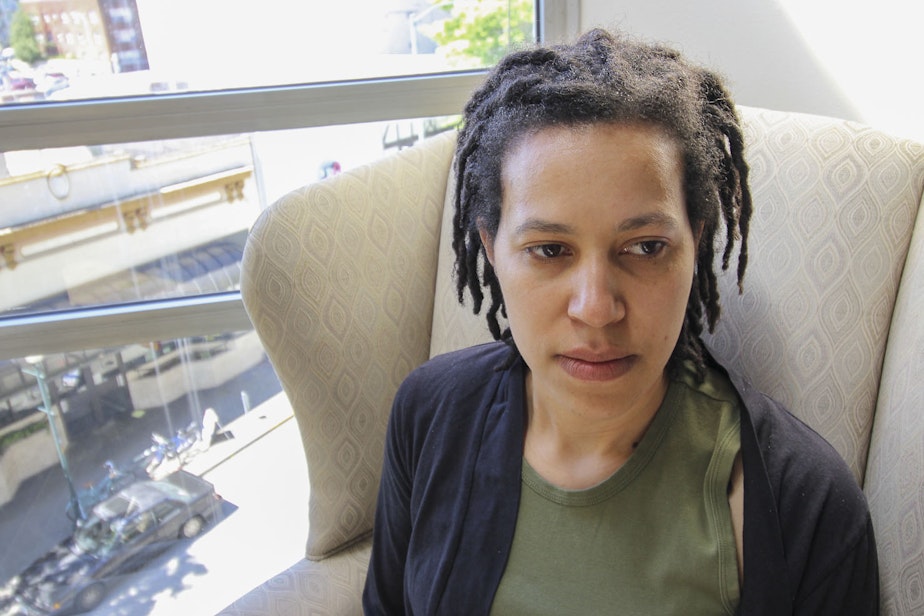Justice so white: King County juries have a diversity problem

When Tara Moss walked into the juror room at King County District Court in Seattle, she did what she says many black people do in white spaces.
“I very strategically walked the space of the entire room to see how many people who appeared black to me were in that room,” Moss said.
“I counted, including myself, three people. And I'm sure there was one or two folks hiding somewhere. But from my observations, there were three out of 150 people who are going to be a potential juror for the next two days for King County that were black.”
It turns out Moss’s observation is a problem for most courts: Juries that represent the diversity of the surrounding area are unusual.
At a recent symposium before the state Supreme Court, attorney Lila Silverstein told the justices that research shows everyone is better served when jury panels reflect the people in their community.
Sponsored
“Racially diverse juries spend more time deliberating, make fewer errors, and result in fairer trials than non-diverse juries,” Silverstein said.
It’s a problem that King County Superior Court Judge Steve Rosen can see from the bench.
“I want my jurors to be a fair cross section of who lives in King County, and it’s my anecdotal opinion, based on the people I see walking into my courtroom and the research we have done, that we are not getting that,” Rosen said. “I will also say that not everybody agrees with me.”
A recent jury survey initiated by Rosen with the Minority and Justice Commission supports his observation.
And a study led by Duke University illustrates the potential fallout in the justice system. Researchers found that all-white juries convicted black defendants 16 percent more often than white defendants. They also found the gap was nearly eliminated when at least one member of the jury was black.
Sponsored
Tara Moss has been summoned for jury duty twice in five years. When she was summoned as a juror for the first time five years ago, she said she felt a sense of duty.
“It really had to do with being aware that I was a black woman who wasn’t in the criminal justice system, who wasn’t so restricted in terms of my finances, and had support from my family. So I needed to show up,” Moss said.
Moss is operations director for the Seattle weekly newspaper Real Change. She wrote about her experience for the paper.
According to experts, the problems with creating diverse juries starts early in the process. Prospective jurors in Washington are summoned through information gathered from voter registrations, driver’s licenses and state identification cards. It’s a complicated, and some say antiquated, system that only recently left behind hard disks.
Once summoned, socioeconomics can play a role in a juror’s decision to show up. Jurors are paid $10 a day, so some may choose to work if their employer won’t cover their time at the court.
Sponsored
And when a black juror gets into a courtroom, lawyers might decide they have implicit bias.
“What happens is — and I think there are statistics that show this — lawyers are more likely to strike people of color from the jury panel and then they will never make it onto the actual jury,” Rosen said.
During her service as a King County juror, Tara Moss ended up in a pool of 50 brought to a courtroom for a case involving shoplifting and indecent exposure. The defendant was black.
Moss didn't make it onto the jury. But during the selection process, a potential juror, who was white, asked to be released.
“I don't feel comfortable being here," the woman said, according to Moss. "I don't believe that the justice system is fair. I don't think that he's being tried by his peers."
Sponsored
For Moss, that was profound. "This woman who is aware of the same kind of dynamics was really realizing that she can't stay here," she said.
Judge Steve Rosen says the data that the survey provided is valuable and he believes it will lead to meaningful change within the justice system.
But it will likely take years. When Rosen and others in the justice system started to work on this problem three years ago, he predicted it would take 10 years to start instituting change because of the complexity of the problem.
“I think that might be the situation we might still be three or four or five or six years from figuring out how to crack this nut,” Rosen said. “But that doesn't mean we should give up trying.”

